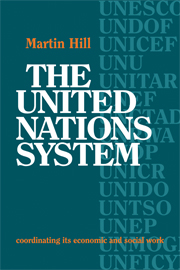Book contents
- Frontmatter
- Contents
- Foreword
- Preface
- Introduction
- Part I The problem of coordination and its setting
- Part II Some conclusions and suggestions
- 8 The context and the perspective
- 9 The role of the Economic and Social Council
- 10 Other aspects of UN–agency relationships
- 11 The functioning of the Administrative Committee on Coordination
- 12 Some structural and organizational issues
- 13 Expansion, adaptation, concentration and the responsibilities of the General Assembly
- Postscript
- 1 Abbreviations and glossary of institutions
- 2 Principal organs of the United Nations (General Assembly, Economic and Social Council and Secretariat) with main subsidiary organs directly concerned with economic and social cooperation and coordination (Status as of Spring 1976)
- 3 Chart of agencies related to the United Nations
- 4 Regional and branch offices of organizations of the United Nations System
- 5 Chart of the United Nations System
- 6 A new UN structure for global economic cooperation–list of conclusions and recommendations of the Group of Experts, prepared by the Secretariat
- Notes
- Index
10 - Other aspects of UN–agency relationships
Published online by Cambridge University Press: 05 November 2011
- Frontmatter
- Contents
- Foreword
- Preface
- Introduction
- Part I The problem of coordination and its setting
- Part II Some conclusions and suggestions
- 8 The context and the perspective
- 9 The role of the Economic and Social Council
- 10 Other aspects of UN–agency relationships
- 11 The functioning of the Administrative Committee on Coordination
- 12 Some structural and organizational issues
- 13 Expansion, adaptation, concentration and the responsibilities of the General Assembly
- Postscript
- 1 Abbreviations and glossary of institutions
- 2 Principal organs of the United Nations (General Assembly, Economic and Social Council and Secretariat) with main subsidiary organs directly concerned with economic and social cooperation and coordination (Status as of Spring 1976)
- 3 Chart of agencies related to the United Nations
- 4 Regional and branch offices of organizations of the United Nations System
- 5 Chart of the United Nations System
- 6 A new UN structure for global economic cooperation–list of conclusions and recommendations of the Group of Experts, prepared by the Secretariat
- Notes
- Index
Summary
Attitudes, practices and policies of intergovernmental organs and Governments
No additional standing machinery for coordination, at the inter-governmental level seems to be needed: on the contrary, every possibility of simplifying the existing machinery should be welcomed and emphasis laid on the development of consultations, and the opening up of channels of direct communication, among ‘opposite numbers’, as well as on the discipline that should be observed by all officials to ensure that their work is well-coordinated with related work in other agencies and programmes. The enforcement of this discipline, which has been repeatedly commended by the Council and the General Assembly but is far from being universally observed or even encouraged in practice, deserves constant attention by the Secretary-General and the heads of agencies and programmes, as well as by ACC.
This suggestion is linked to a change required in the attitude of the Council itself in the interest of its own effectiveness and authority, namely, to devote less time and effort to ‘coordination’ as such and to concentrate under that heading largely on planning and programming and on organization between the United Nations and the agencies as well as within the United Nations itself. The silence about the many critical issues of organization and structure which affect coordination, and have been discussed in Part I, must be broken: these issues should also be aired and considered in preparation, if need be, for General Assembly action.
- Type
- Chapter
- Information
- The United Nations SystemCoordinating its Economic and Social Work, pp. 115 - 125Publisher: Cambridge University PressPrint publication year: 1978



